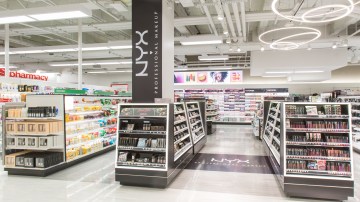Ulta Beauty has been a pioneer in the implementation of AI tools. For example, prior to this year’s AI boom, in 2019, the company acquired AI company QM Scientific to focus on personalization.
This article is based on conversations at the Cult Metaverse Beauty World panel on how AI is benefiting brands. The panel featured Florencia Solari, creative technologist and XR creator, Janvi Shah, CEO and co-founder of Hue, Olivia Lee, co-founder of immersive commerce consultancy Livvium and Joy Fennell, founder of design studio The Future In Black. Attendees included executives from The Hut Group, The Pro Box, Coty, Sephora, L’Oréal and Hue.
QM was Ulta Beauty’s first AI acquisition of several as the retailer has continued to prioritize AI capabilities. Both its digital innovation team and its investment fund, Prisma Ventures, are heavily focused on AI development and training, internally and through their portfolio startups. The venture fund was launched in August 2022 to bring new technologies to Ulta Beauty.
“We’re seeing an emergence of AI taking on a unique role within beauty services, paving the way for more personalized digital experiences that complement customers’ in-store journeys,” said Agustina Sartori, senior director of innovation at Ulta Beauty. “We’re piloting a few programs with innovators like Luum, a robot powered by AI that applies lashes which is currently featured within our San Jose store, and 10Beauty, a full manicure robot. Both are portfolio companies of our investment fund.”
Five-year-old company Luum launched its commercial pilot with Ulta Beauty on December 12 and is meant to provide faster lash extension applications than humans, with appointments for a full set of lashes taking less than 75 minutes. Full sets cost $170 and fill sets cost $80. Luum is hoping to get appointments down to 30 minutes by leveraging the AI training from the commercial pilot. The company secured $2.9 million in seed funding in July 2022. For its part, 10Beauty brings a fully automated five-step manicure process to hair salons, with plans to also offer an at-home service. The company is backed by Oversubscribed Ventures, led by Erin and Sarah Foster.
Ulta Beauty is also bringing generative AI into the customer service experience. In October, the company launched the Ulta Beauty Advisor Chat as a virtual beauty assistant, leveraging GenAI to provide shoppers a convenient way to tap into Ulta’s beauty expertise and resources. In addition, there’s the company’s hairstyle virtual try-on, which uses generative AI to help customers try different hairstyles on-camera.
Ulta has seen impressive results from its integration of advanced digital tools. According to Sartori, the company’s GLAMlab Virtual Try-On, launched in 2016, has seen over 11.5 million visits, with 82 million shades trialed across makeup, lashes, brows and hair. “As guests continue to prioritize beauty as a form of self-expression, we anticipate digital tools will only continue to grow in popularity, as they enable guests to experiment with new products and unlock creativity,” she said. While these services have not directly boosted revenue, they have worked to enhance customers’ shopping experience and keep them engaged on the company’s e-commerce site.
Also through the use of AI, Ulta Beauty is making its content, marketing and services more efficient. “Through Prisma Ventures, we have made several investments in this space, and we work with our portfolio companies to bring new experiences to life,” said Sartori. Investments range from Y Combinator startup Iliad.ai, which is a tool that designs digital assets leveraging generative AI, to MyAvana, an AI-generated hair analysis company that identifies hair types and conditions and provides product recommendations.
For its newest investment, MIRI.health, Ulta closed a $1.2m pre-seed round in July. It’s one of the first AI investments the company has made in the health and wellness sector. Miri uses generative AI to act as a pocket wellness coach for users via their phones. Sartori anticipates that, as Ulta Beauty gets deeper into wellness, its investment fund will follow suit. On November 30, the company reported third-quarter 2023 earnings of $2.49 billion, up 6% year-over-year.




